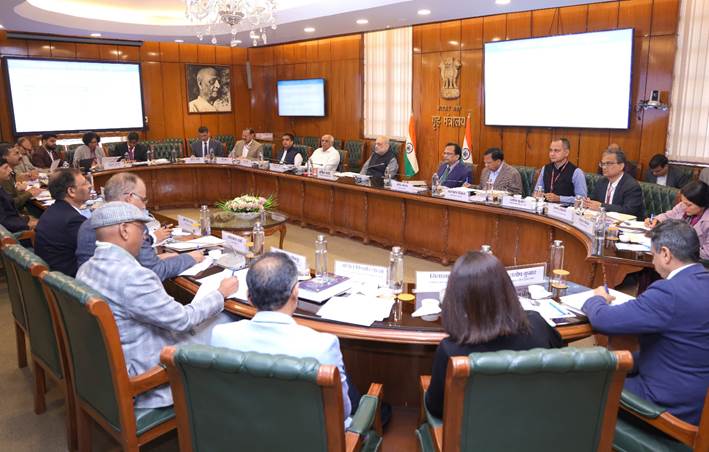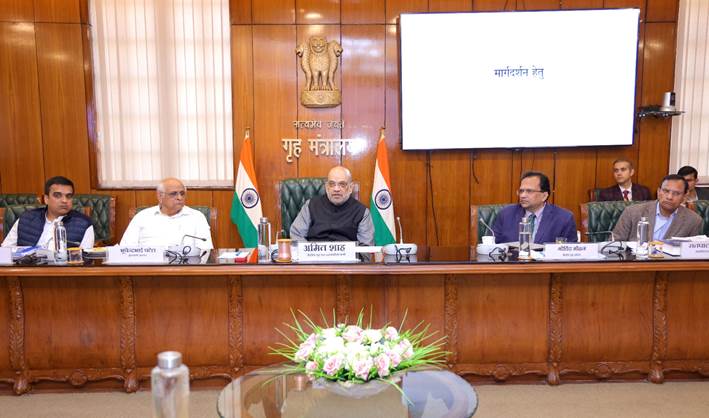New Delhi: The Union Home Minister and Minister of Cooperation, Amit Shah, chaired a review meeting today in New Delhi on the implementation of three new criminal laws in Gujarat, alongside Gujarat’s Chief Minister Bhupendra Patel. The meeting reviewed the progress and current status of various provisions related to police, jails, courts, prosecution, and forensics in Gujarat. Attendees included Gujarat’s Minister of State for Home, the Union Home Secretary, Gujarat’s Chief Secretary, Director General of Police, Director General of the National Crime Records Bureau (NCRB), and senior officials from both the Union Home Ministry and the State Government.
During the discussion, the Union Home Minister highlighted that the essence of the three new criminal laws introduced by Prime Minister Narendra Modi lies in ensuring justice within three years, from the filing of an FIR to the Supreme Court’s verdict in any case. Amit Shah commended the Gujarat government’s progress in implementing the new laws, urging that they be fully implemented in all commissionerates by April 30, 2025, and across the entire state as soon as possible. He recommended monthly reviews by the Chief Minister of Gujarat, fortnightly reviews by the State Home Minister, and weekly reviews at the level of the Chief Secretary, Additional Chief Secretary (Home), and Director General of Police.
Amit Shah noted that Gujarat had successfully filed charge sheets in over 92% of cases involving sentences of more than 10 years and stressed that a review should be conducted for the remaining cases to ensure proper utilisation of the Act’s provisions. He also praised the state for converting Zero FIRs into 100% regular FIRs and urged the establishment of a system for transferring FIRs between states through the Crime and Criminal Tracking Network and Systems (CCTNS). He recommended adopting CCTNS 2.0 in Gujarat.
On the subject of electronic evidence in the new laws, the Home Minister suggested that the state’s Home and Health Departments should collaborate to ensure electronic transmission of post-mortem and medical reports from hospitals. He also highlighted the importance of establishing a system for recording evidence via video conferencing in prisons, government hospitals, banks, forensic science laboratories (FSL), and other locations. He proposed that each court in the prisons should have a video conferencing cubicle.
The Union Home Minister further directed the police to provide details of people detained for questioning on the electronic dashboard, including seizure lists and cases to be forwarded to the courts. He instructed the state Director General of Police to monitor these cases continuously and called for an increase in network connectivity speed in police stations to 30 Mbps, exceeding prescribed standards.
Amit Shah emphasised the need for the state government to issue circulars to prevent the misuse of provisions related to organised crime, terrorism, and mob lynching, ensuring that permission from the highest level is required for such cases. He also stressed the importance of initiating Trial in Absentia for fugitives who have been evading the country, particularly in national security-related cases.

The Home Minister called for the availability of at least two forensic science mobile vans in each district and encouraged efforts to ensure that all 12 kits used in mobile forensic vans are manufactured in India. He praised Gujarat’s initiative of the Forensic Crime Manager and urged other states to adopt it. He also stressed the importance of clearing pending forensic cases through a special campaign and called for the prompt recruitment of vacant positions in the forensic department.
Amit Shah also acknowledged the Gujarat High Court’s directive, issued on January 22, 2025, for all subordinate courts to implement e-processes, which he considered a commendable initiative. He encouraged other states to follow suit. Additionally, he called for the timely recruitment of vacant positions in the Directorate of Prosecution and emphasised that judicial officers should be included in training programmes, with sessions conducted in coordination with Judicial Academies.


